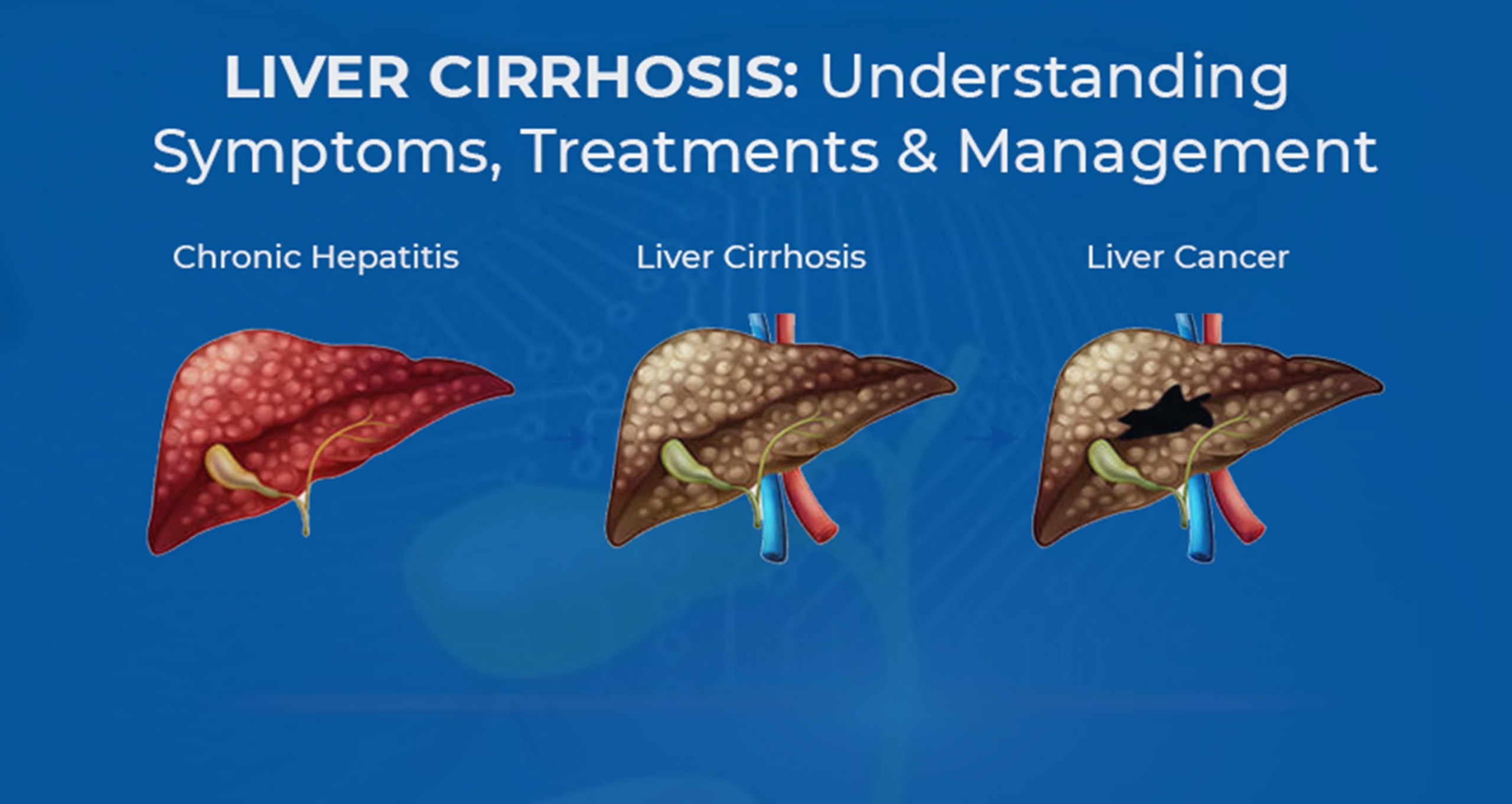Cirrhosis Diagnosis and Management
Cirrhosis is a progressive liver disease that occurs when healthy liver tissue is replaced by scar tissue due to long-term liver damage. It can be caused by chronic hepatitis, alcohol abuse, non-alcoholic fatty liver disease (NAFLD), and other conditions. Early diagnosis and proper management are vital to prevent liver failure and improve quality of life. Healtour Solutions connects you with the best hospitals and specialists in India for effective cirrhosis diagnosis, treatment, and ongoing management.
Common Causes of Cirrhosis
- Chronic Hepatitis B or C
- Alcohol abuse
- Non-alcoholic fatty liver disease (NAFLD)
- Autoimmune liver diseases
- Genetic liver disorders
- Chronic liver infections
Symptoms of Cirrhosis
- Jaundice (yellowing of the skin and eyes)
- Swelling in the abdomen or legs
- Easy bruising or bleeding
- Chronic fatigue
- Nausea or vomiting
- Unexplained weight loss
- Itchy skin
- Confusion or memory loss (due to hepatic encephalopathy)
If you experience these symptoms, early intervention and diagnosis are essential to manage cirrhosis effectively.
How Cirrhosis is Diagnosed
Cirrhosis diagnosis involves a combination of medical history review, physical examination, and diagnostic tests, such as:
- Blood Tests: To assess liver function and detect underlying causes of cirrhosis (e.g., liver enzymes, bilirubin levels).
- Ultrasound: Imaging to assess liver size, detect scarring, and identify potential complications.
- CT Scan/MRI: Detailed imaging to identify cirrhosis-related complications such as liver tumors or varices.
- Liver Biopsy: A sample of liver tissue is taken to determine the extent of liver damage.
- Endoscopy: To check for varices, which are enlarged veins that can occur in advanced cirrhosis.
Cirrhosis Treatment and Management Options
Cirrhosis treatment focuses on managing symptoms, slowing progression, and addressing underlying causes. Treatment options may include:
Medications:
- Antiviral Medications for hepatitis B or C to reduce liver inflammation and prevent further damage.
- Diuretics to manage fluid retention (ascites) in cirrhosis.
- Lactulose and other medications to manage hepatic encephalopathy (brain dysfunction caused by liver failure).
- Immunosuppressive Drugs for autoimmune liver disease management.
Liver Transplantation:
For patients with end-stage cirrhosis or liver failure, a liver transplant may be necessary to replace the damaged liver with a healthy one from a donor.
Lifestyle Changes:
- Dietary Adjustments: A low-sodium diet to reduce fluid buildup and manage ascites.
- Avoiding Alcohol: Stopping alcohol consumption is crucial to prevent further liver damage.
- Exercise and Weight Management: Essential for managing NAFLD and improving overall liver health.
Surgical Treatment:
- Liver Resection: If cirrhosis is associated with liver cancer, surgical removal of tumors may be required.
- Endoscopic Procedures: To manage varices or treat internal bleeding in advanced cirrhosis.
Benefits of Expert Cirrhosis Management
- Early Diagnosis: Timely diagnosis helps prevent severe liver damage and enhances the quality of life.
- Personalized Care: Treatment plans tailored to individual needs based on the severity and underlying causes of cirrhosis.
- Access to Expert Care: Connect with top hepatologists and gastroenterologists in India for specialized care.
- Advanced Diagnostic Tools: State-of-the-art equipment for accurate diagnosis and precise treatment options.
- Affordable Treatment: World-class cirrhosis management at a fraction of the cost compared to Western countries.
Why Choose Healtour Solutions for Cirrhosis Treatment?
- Expert Specialists: Our network includes renowned hepatologists, liver transplant surgeons, and gastroenterologists for comprehensive care.
- World-Class Hospitals: Healtour Solutions partners with leading medical institutions in India equipped with cutting-edge technology.
- Personalized Treatment: We offer individualized care plans to manage your condition effectively.
- Affordable Solutions: High-quality treatment options available at competitive prices.
- Patient-Centered Care: We prioritize your well-being and provide support throughout your treatment journey.
Step-by-Step Process for Cirrhosis Treatment
- Consultation: Begin with an initial consultation with a specialist to discuss symptoms and medical history.
- Diagnosis: Undergo necessary diagnostic tests, including blood tests, imaging, and a liver biopsy, to confirm the extent of liver damage.
- Treatment Plan: A customized plan will be developed based on your diagnosis, which may include medications, lifestyle changes, or surgery.
- Monitoring: Continuous monitoring through regular check-ups, blood tests, and imaging studies to manage cirrhosis progression.
- Recovery and Aftercare: Post-treatment care includes follow-up visits, medications, and lifestyle management to ensure long-term liver health.
Contact Us for Cirrhosis Diagnosis and Management
If you are experiencing symptoms of cirrhosis or need expert care, reach out to Healtour Solutions. We connect you with the best specialists and hospitals in India for top-tier cirrhosis treatment and management. Contact us today for a consultation and take the first step toward better liver health.
FAQs About Cirrhosis Diagnosis and Management
- What causes cirrhosis?
Cirrhosis can be caused by chronic liver conditions such as hepatitis B or C, alcohol abuse, fatty liver disease, autoimmune liver diseases, and more.
- How is cirrhosis diagnosed?
Cirrhosis is diagnosed through blood tests, imaging studies (ultrasound, CT, MRI), and sometimes a liver biopsy.
- What are the symptoms of cirrhosis?
Symptoms include jaundice, swelling, abdominal pain, fatigue, and confusion. Early signs often go unnoticed until the disease advances.
- Can cirrhosis be cured?
Cirrhosis is a chronic condition, and while it can be managed, it cannot be fully cured. Liver transplant may be necessary in severe cases.
- What is a liver transplant for cirrhosis?
A liver transplant is a surgical procedure where a damaged liver is replaced with a healthy liver from a donor. It is used when the liver has stopped functioning.
- How is cirrhosis treated?
Treatment includes managing symptoms with medications, lifestyle changes, and in some cases, liver transplantation or surgery.
- Can cirrhosis lead to liver cancer?
Yes, cirrhosis increases the risk of liver cancer due to the continuous scarring of liver tissue, which can cause cancerous changes.
- Is cirrhosis related to alcohol consumption?
Yes, long-term alcohol abuse is one of the leading causes of cirrhosis.
- Can cirrhosis be prevented?
Preventing cirrhosis includes avoiding excessive alcohol use, maintaining a healthy diet, managing conditions like hepatitis, and regular medical checkups.
- How often should I get checked for cirrhosis?
If you are at risk for cirrhosis, such as having a history of hepatitis or alcohol use, you should get regular liver function tests and check-ups.



